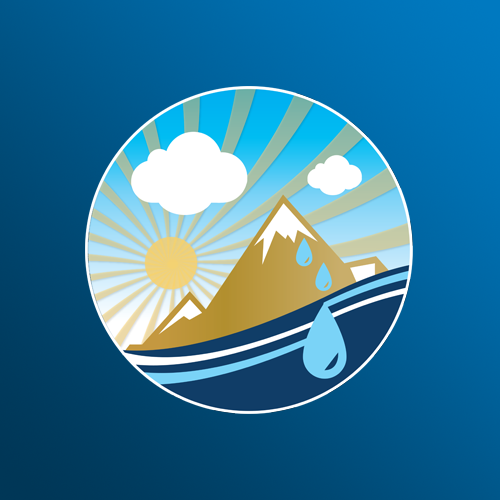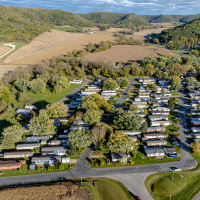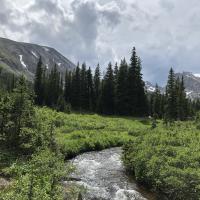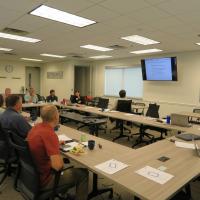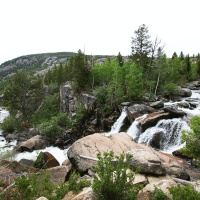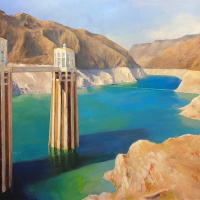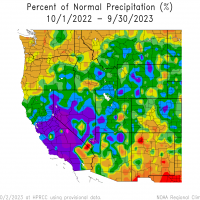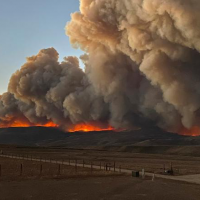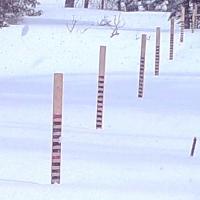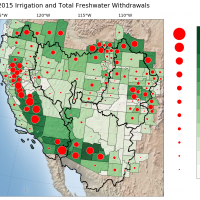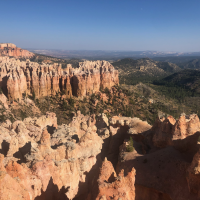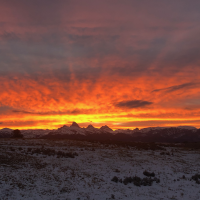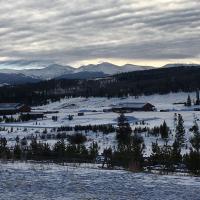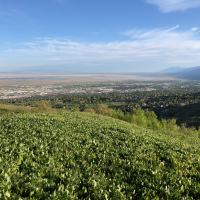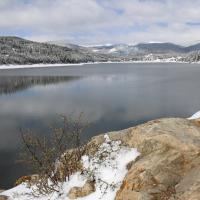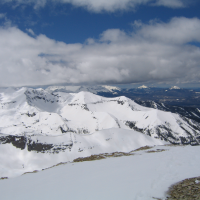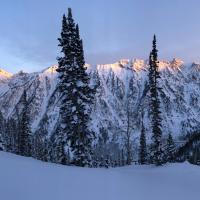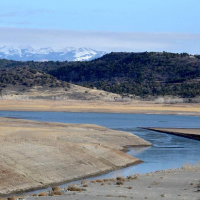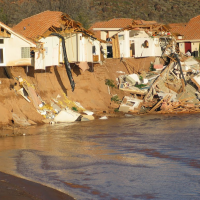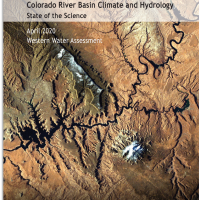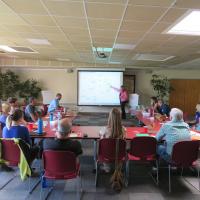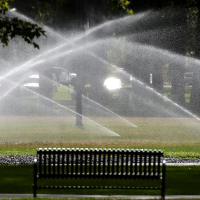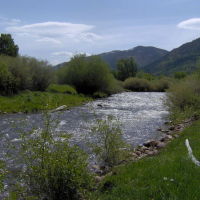Below is a list of WWA's current research projects.
-
Long-term Wildfire Recovery in Rural Communities in Colorado, New Mexico, and Arizona
This project works with social services and public health professionals, who are a critical part of the social infrastructure in community recovery, as well as rural community partners to understand the often overlooked community impacts of wildfire. WWA is partnering with CLIMAS, the Arizona and New Mexico CAP team, to explore these questions in Arizona, Colorado, and New Mexico.- Arizona
- Colorado
- New Mexico
-
Challenges to Building Resilient Water Systems Webinar Series
The Challenges to Building Resilient Water Systems Webinar Series will run monthly from October 2024 through April 2025 and cover topics such as new climate monitoring and prediction tools, temperature and precipitation extremes and post-2026 Colorado River Basin water policy. In winter 2025, WWA will convene an in-person symposium on the Front Range of Colorado and Utah’s Wasatch Front to connect water managers with researchers to share recent research and climate resilience efforts- Colorado
- Utah
- Wyoming
- Building Resilient Water Systems
-
Building Climate Resilience Within Mobile Home Park Communities
In Spring 2024, Western Water Assessment launched a new project focusing on understanding climate risks and building climate resilience within mobile home park communities. Mobile home park residents face unique and disproportionate exposure to climate related hazards, including heat, fires, and floods. Further, mobile home residents often are left out of many climate and disaster related assistance programs, due to the unique housing structure of mobile home parks. Addressing the needs of mobile home park communities is key to building climate resilience.- Colorado
-
Building cross-scale understanding and collaboration to support wildfire-resilient water systems
[Project 6]
Water system managers in the Intermountain West face enormous challenges navigating unpredictable streamflow forecasts, changing snowpack behavior, and the increasingly dangerous threat of wildfire to both water quality and quantity. In this project, we aim to engage directly with water system managers in an iterative project to (1) increase understanding of their perceptions of water system resilience, (2) identify key components of regional water system resilience across a range of scales from small rural systems to larger urban systems, and (3) convene cross-scale water manager conversations to support peer learning and identify opportunities to collaboratively build equitable and just regional water system resilience. This project stems directly from conversations with the US Forest Service, Northern Water, and Denver Water.- Colorado
- Building Resilient Water Systems
-
Building understanding for water system resilience to changing streamflows
[Project 3]
In this project, we will engage with water providers, tribal representatives, agricultural and other water users, ecological interests, and recreational groups about future snowpack and streamflow conditions, increasing understanding of how they view water system resilience to compound hazards. This continued engagement is essential both to disseminate new research findings and to understand evolving information and planning landscapes.- Colorado
- Utah
- Wyoming
- Building Resilient Water Systems
-
Adapting to Climate Change in Wyoming
Wyoming communities face increasing climate-related risks including wildfire, drought, flooding, and heat waves. This funding competition provided a rare and important opportunity to directly support adaptation and build climate resilience in communities in the state. Applicants provided brief, five-page descriptions of their projects. Proposals were ranked based on their demonstrated community interest, resources and networks in place to support the project, realistic budget and timeline, appropriate and sufficient partners, strong connection to their communities, clarity about how resilience or adaptation would be built through the project, their plan for communicating with WWA and leveraging of WWA resources, their plan for and potential impact of external outreach, and the quality, novelty, and innovation of their ideas.- Wyoming
- Building Resilient Communities
-
Fifth National Climate Assessment (NCA5) Chapter 4 – Water
The National Climate Assessment (NCA) is a congressionally mandated quadrennial report prepared and submitted by the US Global Change Research Program. The fifth iteration of this report (NCA5), published in November 2023, provides the scientific foundation to support informed decision-making across the United States.
WWA’s Liz Payton is the lead author of the water chapter. She built and led a team of 11 experts from across the country who work in academia, local utilities, state and federal agencies, and private consulting. They brought expertise in hydrology, climate science, groundwater, drought, extreme precipitation and flooding, water quality, snow, and water resources tools and data. The chapter analyzes current climate trends and projects future trends based on a comprehensive review and assessment of peer-reviewed literature and climate and infrastructure data. -
Intermountain West Climate Dashboard
The Intermountain West Climate Dashboard, which debuted in October 2012, is our most popular resource that provides information and graphics about current and forecasted regional weather, climate, and water information. Feedback from WWA stakeholders through multiple program evaluations and analyses of website traffic indicate that the dashboard is a very useful ‘one-stop shop’ for up-to-date climate and water information for WWA’s three-state region.- Colorado
- Utah
- Wyoming
- Climate and Hydrology in the Colorado River Basin
-
High-Impact Events Database
High-impact events cause the majority of societal costs related to weather and climate. They provoke societal responses that can either enhance or detract from long-term adaptation to climate risk. In 2015, WWA began a new research focus on extremes that is designed to place high-impact events in the context of historical climate variability and projected climate change, assess how the risk of these events varies over time and space, and examine how high-impact events interact with place-based vulnerability.- Colorado
- Utah
- Wyoming
-
Snowtography: Snowpack & Soil Moisture Monitoring Handbook
CompletedThe snowtography handbook guides readers through the process of establishing their own snowtography and soil moisture monitoring stations. It offers guidance on site selection, snowtography options, equipment requirements, and installation. The instructions are based on snow-forest research and hands-on experience at multiple sites in Arizona, and in the San Juan National Forest in southwestern Colorado.- Arizona
- Colorado
- Climate and Hydrology in the Colorado River Basin
-
ACCESS: Anthropogenic Water Management, Climate Change, and Environmental Sustainability in the Southwestern US
ACCESS is a collaborative project among researchers at Michigan State University and the University of Colorado Boulder funded by the National Science Foundation.
Led by Drs. Yadu Pokhrel and Lifeng Luo at MSU and Dr. Ben Livneh and Liz Payton at CU, the project engages with stakeholders throughout the Southwest US to assess whether current management practices can meet future water demands while maintaining environmental water requirements, and if not, whether there are alternative approaches to achieving water and environmental sustainability. The project uses a comprehensive modeling framework that integrates key drivers of hydrologic change and water management while also accounting for environmental water needs.
- Arizona
- California
- Colorado
- Nevada
- New Mexico
- Utah
- Wyoming
- Climate and Hydrology in the Colorado River Basin
-
Building climate resilience in rural gateway communities
[Project 10]
Gateway and natural amenity region (GNAR) communities are those located outside of significant natural amenities, like national parks, public lands, ski areas, and scenic rivers. These communities are heavily dependent on nearby natural amenities for their economic well-being; as a result, they may be particularly hard hit by climate change. In this project, we will leverage the infrastructure and relationships developed by WWA Investigator Danya Rumore’s GNAR Initiative to identify rural community concerns related to natural hazards and collaboratively develop tools and resources to increase their resilience.- Colorado
- Utah
- Wyoming
- Building Resilient Communities
-
Understanding Social Networks to Facilitate Resilience
[Project 9]
When communities experience the impacts of compound hazards, responses are often reactive and it is often too late to respond in an efficient and effective manner. Just as academic disciplines are often siloed, sectors and decision-makers can be siloed from one another and not understand interconnections or linkages in decision-making. Social network analysis has been used to understand how information and resources flow through a system and how they influence adaptation actions. While social networks have been looked at retrospectively, they have rarely been assessed in a co-produced approach with stakeholders to proactively assess and shift networks to build system resilience.- Colorado
- Wyoming
- Advancing Adaptation and Resilience Science
-
Sense of Place and Adaptive Capacity in the Intermountain West
[Project 8]
Planners, public land managers, and community decision-makers anecdotally understand and experience the importance of sense of place but may not understand how it can be leveraged to build adaptive capacity to help communities respond to and navigate change. In this project we will collect and compare data across the Intermountain West to better understand how sense of place might be leveraged to assist in adaptation efforts.- Colorado
- Utah
- Wyoming
- Advancing Adaptation and Resilience Science
-
Assessing Current and Future Research Needs Among Communities in Wyoming
[Project 7]
Carbon-dependent communities are facing increasing economic pressures as fossil fuel industries decline, creating a major societal stressor in these communities. At the same time, they also face worsening climate impacts and other hazards, which can cause increasing vulnerabilities concurrent with decreasing adaptive capacity. This project focuses on small rural communities and tribes in Wyoming, addresses our understanding of adaptation needs in carbon-dependent communities, and explores opportunities for building resilience to compound hazards in our region. This project prioritizes the needs and perspectives of rural and tribal communities to support long-term resilience and build networks for future engagement and planning.- Wyoming
- Building Resilient Communities
-
After the fire: Informing water systems management in burned landscapes
[Project 5]
Wildfires create hazards for lives and property through combustion and high temperatures, as well as their impacts to catchment source water. This project focuses on these water-related vulnerabilities, which include far-reaching effects on flood risks, on aquatic habitats, and on water treatment costs.- Colorado
- Building Resilient Water Systems
-
Building resilience to compounding impacts of wildfire and snowpack declines
[Project 4]
Wildfire is a critical vulnerability for water systems in the Intermountain West, particularly those with intakes located in or downstream of forested areas. This project seeks to increase our understanding of the status of water system resilience in the context of changing wildfire risk. It will make key advances by explicitly quantifying the role of fine-scale, spatially distributed snowpack in wildfire risk/resilience under a range of historical precipitation/temperature conditions, as a way to anticipate future wildfire risks under climate change scenarios. The critical advances in scale will support the use of finer land surface/ecological classifications in wildfire risk assessments of future climate projections.- Colorado
- Utah
- Wyoming
- Building Resilient Water Systems
-
Usability of medium-range forecasting for water system reliability
[Project 2]
This project aims to build water system resilience by increasing understanding of the impacts of persistent low streamflows on water systems that rely on surface water sources.- Utah
- Building Resilient Water Systems
-
Supporting Resilient Planning Among Regional Water Providers
[Project 1]
This project supports water system resilience through use-inspired research that helps providers prepare for vulnerabilities due to seasonal water supply prediction errors. We will make meaningful advances in the understanding of existing water supply forecast vulnerabilities and identifying realistic potential adaptations for water systems.- Colorado
- Utah
- Wyoming
- Building Resilient Water Systems
-
Downscaled Temperature and Precipitation Projections for Southwestern Colorado
CompletedAnalysis of downscaled climate projections for the San Juan Mountains to understand their accuracy at simulating temperature and precipitation patterns in the region- Colorado
-
Identifying Alternatives to Snow-based Streamflow Predictions to Advance Future Drought Predictability
Working with utilities to understand future streamflow prediction -
Climate and Flooding Project: Supporting Flood Planning in the Mountain West Region in the Context of Climate Change Impact, Future Growth and Migration
CompletedCross-RISA collaborative modeling and stakeholder engagement to support inland flood planning- Colorado
-
Usability of Remotely Sensed Snowpack Data for Streamflow Forecasting and Water System Management
Using remotely sensed snowpack data to reduce negative impacts in water management- Montana
-
Colorado River Basin Climate and Hydrology: State of the Science
CompletedColorado River Basin Climate and Hydrology: State of the Science aims to create a shared understanding of the physical setting and the latest data, tools, and research underpinning the management of Colorado River water resources. In identifying both challenges and opportunities, the report will guide water resource managers and researchers in efforts to improve the short-term and mid-term forecasts and long-term projections for the basin's water system.- Arizona
- California
- Colorado
- Nevada
- New Mexico
- Utah
- Wyoming
- Climate and Hydrology in the Colorado River Basin
-
VCAPS Project: Convening a series of climate adaptation workshops with communities in the Mountain West
Originally developed by the Carolinas Integrated Sciences and Assessments (CISA) program and the Social Environmental Research Institute (SERI), VCAPS helps communities become more resilient to weather and climate change. Lisa Dilling
Lisa Dilling
 Katie Clifford
Jeff Lukas
Katie Clifford
Jeff Lukas Seth Arens
Jennifer Henderson
Seth Arens
Jennifer Henderson Benét Duncan
Benét Duncan
 Imtiaz Rangwala
Imtiaz Rangwala
 Ethan Knight
Ethan Knight
- Colorado
- Utah
- Wyoming
- Building Resilient Communities
-
Balancing Severe Decision Conflicts Under Climate Extremes in Water Resource Management
CompletedExploring the utility of multi-objective evolutionary algorithms (MOEAs) for improving the ability of water utilities to identify viable adaptation strategies under climate extremes
- Colorado
- Building Resilient Water Systems
-
Dynamics of Drought Vulnerability Between Urban and Rural Communities
CompletedUnderstanding who and how populations are impacted by drought- Colorado
- Kansas
-
Sustained climate assessment in the U.S. Southwest
Evaluating sustained assessment activities in the Southwest US- Arizona
- California
- Colorado
- Nevada
- New Mexico
- Utah
-
Advancing the Use of Drought Early Warning Systems in the Upper Colorado River Basin
CompletedIdentifying opportunities to improve drought risk management by characterizing decision processes and assessing the robustness of snowpack drought indicators.
- Colorado
- Advancing Adaptation and Resilience Science
-
Regional Extremes Database and Event Maps
CompletedDeveloping a database and visualizations of extreme events to assist hazard planners and emergency managers.- Colorado
- Utah
- Wyoming
-
Use of Potential Evapotranspiration to Predict Future Water Use
CompletedUsing downscaled projections of future potential evapotranspiration to predict future water demand- Utah
-
Mapping Climate Services
CompletedToward closing the gap between climate service providers and users- Arizona
- California
- Colorado
- Nevada
- New Mexico
- Utah
- Wyoming
- Advancing Adaptation and Resilience Science
-
Extreme Precipitation Estimation Under Climate Change for Dam Safety
CompletedAssessing the state of the science and practice in extreme precipitation estimation under climate change- Colorado
- New Mexico
-
Drought Planning on the Wasatch Front Using Paleo-Drought Information and Future Climate Projections
CompletedDrought contingency plan development for Weber Basin Water Conservancy District- North Dakota
- South Dakota
- Utah
- Advancing Adaptation and Resilience Science
-
A Socioeconomic Impacts and Adaptation Strategies Clearinghouse
CompletedDevelopment of an online, searchable database to provide stakeholders with resources regarding socioeconomic impacts of climate change in the Western Water Assessment region- Colorado
- Utah
- Wyoming
-
Reconstructing Environmental Flows on the Yampa River
CompletedDeveloping a pilot effort to reconstruct natural flows in order to understand ecological responses to alterations of natural flow patterns -
Evaporation, Drought, and the Water Cycle Across Timescales: Climate Foundational Sciences for the North Central Climate Science Center
CompletedProviding climate science support for the DOI North Central Climate Science Center, particularly for water cycle issues -
Evaluation of Drought Planning Research on the Wind River Reservation
CompletedProviding support for tribal drought planning efforts on the Wind River Reservation- Wyoming
-
Analyzing Expressed Stakeholder Needs in the Western Water Assessment Region
CompletedSystematic examination of stakeholder needs for climate information through previous documentation, in order to avoid replicating previous efforts and exacerbating stakeholder fatigue -
Update of the Climate Change in Colorado report
CompletedComprehensive synthesis of observed and projected climate co-produced directly with the Colorado Water Conservation Board- Colorado
-
Snowmelt Perturbations and Water Supply Forecast Errors
CompletedA collaborative effort among WWA hydrologists, ecologists, weather and climate experts, and operational forecasters at the NOAA Colorado Basin River Forecast Center in an effort to use a suite of modeling and observation techniques to better understand drivers of snow accumulation and melt in the Upper Colorado River Basin with the ultimate goal of improving CBRFC forecasts Jeff Deems
Jeff Deems
 Ben Livneh
Snowmelt Perturbations and Water Supply Forecast Errors
Ben Livneh
Snowmelt Perturbations and Water Supply Forecast Errors Noah Molotch
Noah Molotch
Joseph Barsugli
Klaus Wolter -
Evaluation of Western Water Assessment’s “Utah Model”
CompletedAssessment of the preliminary results of WWA’s effort to expand its presence in Utah- Utah
-
Evaluation of NIDIS Upper Colorado River Basin Drought Early Warning System
CompletedEvaluation of utility of NIDIS’s first drought early warning system (DEWS) to provide lessons for other regional DEWS efforts- Colorado
- New Mexico
- Utah
- Wyoming
-
Drivers of Adaptation: A Comparative Analysis of Local Decision Making in the American West
CompletedMulti-year effort to systematically investigate how and why local decision makers in cities and large towns in Colorado, Utah, and Wyoming prepare for and respond to weather and climate-related risk and hazards, such as blizzards, tornadoes, and floods.- Colorado
- Utah
- Wyoming
-
High-Resolution Meteorological and Hydrologic Data Extension to Trans-Boundary Basins in the Conterminous U.S., Southern Canada and Northern Mexico
CompletedUsing hydrologic modeling to examine the influence of dust deposition and climate change on snowmelt, runoff timing, and volume in the Colorado River Basin -
Decisionmaking Under Hydro-Climatic Uncertainty
CompletedDevelopment of models and other tools capable of understanding how decision deal with hydro-climatic uncertainty in climate adaptation, including response to droughts- Colorado
- Utah
- Wyoming
-
Colorado Climate Change Vulnerability Study
CompletedOverview of key climate-related vulnerabilities facing several sectors in the State of Colorado.- Colorado
-
Climate Adaptation Guidance for Salt Lake City Public Utilities
CompletedWorking with the Salt Lake City Department of Public Utilities (SLCDPU) to help them assess the challenges that climate change presents to their water supply system- Utah
-
Building Climate Science into Land and Water Conservation Planning and Decisionmaking in the American Southwest
CompletedProject funded by intra-RISA competition to pilot new efforts to integrate climate science into conservation adaptation efforts developed by The Nature Conservancy in the Southwest- Colorado
-
Water, Energy, and Climate Change: Freshwater Use by Power Plants in the United States
CompletedUnderstanding the impacts of electricity generation on freshwater resources in a warming worldWater, Energy, and Climate Change: Freshwater Use by Power Plants in the United States Imtiaz Rangwala
Imtiaz Rangwala
-
Paleohydrology of the Lower Colorado River Basin
CompletedBuilding on previous efforts to understand the natural long-term variability of the Colorado River basin by generating paleohydrologic reconstructions of annual flows between Lees Ferry and Imperial Dam and the Gila River at its mouth -
Paleohydrology of the Lower Colorado River Basin
CompletedBuilding on previous efforts to understand the natural long-term variability of the Colorado River basin by generating paleohydrologic reconstructions of annual flows between Lees Ferry and Imperial Dam and the Gila River at its mouth -
Climate Related Decisionmaking on Public Lands in the Intermountain West
CompletedSurvey of public land managers in the Intermountain West to gauge their awareness of climate variability and change, and their willingness to incorporate climate information into planning- Colorado
- Utah
- Wyoming
-
Climate Change Preparedness Among Tribal Communities in the American West
CompletedBuilding new stakeholder relationships with native communities and understanding tribes’ needs for relevant climate information and assistance to prepare for climate change -
Water-Energy-Climate Change Nexus
CompletedPublication of a book providing an overview of the nexus among water, energy, and climate issues in the western United States -
Towards Frameworks for Climate Services: Meeting the Needs of Different Users with Different Information Requirements
CompletedDemonstrating the River Forecast Center (RFC) Water Resources Outlook tool at user workshops to help identify differences in the user populations and determine changes in the Water Resources Outlook product that might be necessary for different types of users -
Regional Integration Among Municipal and Industrial (M&I) Water Providers
CompletedCase-based analysis of regional integration among M&I water providers in the West as a means of improving resiliency in the face of climate change- California
- Colorado
- Nevada
-
Pilot Climate Extension Services in Utah
CompletedContinuing effort by WWA researchers located at the Utah Climate Center to pilot small-scale climate services relevant to various stakeholders in Utah- Utah
-
Lessons Learned from Australia’s Drought Experiences
CompletedCommunicating lessons learned applicable to the Colorado River Basin from an investigation of water management in South Australia -
Exploring Regional Climate Service Collaborations
CompletedAnalyzing and reporting on collaborations among three regional climate service entities to provide lessons learned -
Drought Adaptation Among Ranchers in the Intermountain West
CompletedIdentification and measurement of the effects of drought adaptations among agriculturalists in the “Three Corners” region of Colorado, Wyoming, and Utah via detailed surveys of their decision-making- Colorado
- Utah
- Wyoming
-
Climate adaptation for Western National Forests
CompletedConducting a pilot climate vulnerability assessment for the Shoshone National Forest as part of a broader effort by the US Forest Service to develop a climate adaptation toolkit- Wyoming
-
Boulder County Climate Change Preparedness Plan
CompletedDevelopment of policy-oriented climate change adaptation plan for Boulder County and the City of Boulder, Colorado- Colorado
-
Assessment of Documented Needs for Climate Information in the Missouri River Basin
CompletedInitial assessment of Missouri Basin stakeholder needs for information on impacts of climate variability and change -
Analysis of Use of Information by Stakeholders of the Colorado Basin River Forecast Center
CompletedEffort to understand the flow of forecast information to stakeholders of the NOAA Colorado Basin River Forecast Center- Arizona
- Colorado
- Utah
-
Weber Basin Climate Sensitivity Analysis
CompletedExploring climate change impacts on water supplies from the Weber River Basin- Utah
-
Stochastic Streamflow Simulation at Interannual and Interdecadal Time Scales and Implications to Water Resources Management in the Colorado River Basin
CompletedAnalysis of streamflow variability at short (interannual) and long (interdecadal) time scales to support Bureau of Reclamation management activities on the Colorado RiverBalaji RajagopalanEdith ZagonaStochastic Streamflow Simulation at Interannual and Interdecadal Time Scales and Implications to Water Resources Management in the Colorado River Basin -
NEPA, Climate Change, and Public Lands Decisionmaking
CompletedProviding legally relevant guidance on how public land management agencies can address climate change in decision documents -
Cross-Jurisdictional Water Marketing
CompletedSynthesis of lessons learned about interstate water marketing in the American West -
Controls on pH and Ammonia Toxicity in Rivers of the Colorado Plains
CompletedDevelopment of a modeling framework to predict changes in water quality in response to climate variation or changes in water management- Colorado
-
Colorado Climate Preparedness Project
CompletedPreliminary assessment of climate impacts and adaptations relevant to state agencies in Colorado; development of an online adaptation database- Colorado
-
Climate Science Support for Vulnerability Assessment of the Gunnison Basin
CompletedProviding climate science support and guidance for a multi-stakeholder effort to assess climate change vulnerability in the Gunnison River Basin- Colorado
-
Climate Change Impacts on Public Lands in the Upper Colorado River Basin
CompletedDevelopment of a model, with managers at the BLM/USFS San Juan Public Lands Center, to understand the vulnerability of public lands to drought based on ecological and physical factors- Colorado
